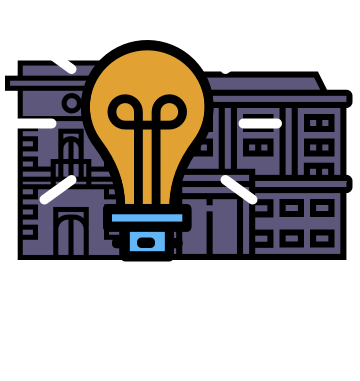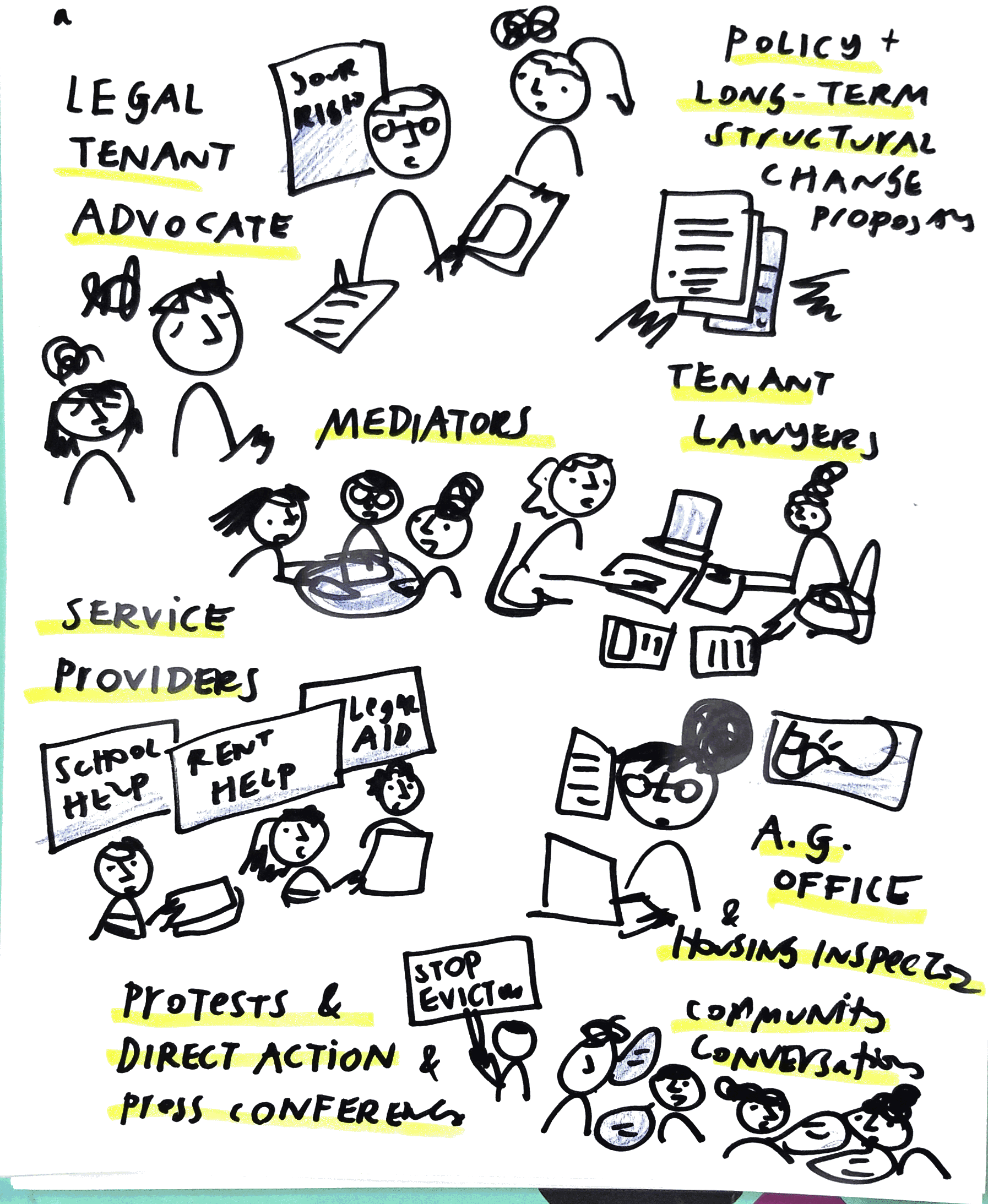What can a court do to mitigate the harms of an eviction?
Local and state court leaders have a large role in whether and how evictions happen. What kinds of programs can courts pilot, to prevent unlawful evictions and mitigate the harms evictions can have on landlords and tenants?
This page collects the various options that courts can take leadership around.
Court policies & programs overview
When happens during an eviction lawsuit? This set of policies focus on court-related rules, protections, and procedures that can contribute to eviction protection.
Some court-related policies that can prevent evictions include:
Right to Counsel to have expert advice & representation of tenants facing an eviction.
Defenses & counter-claim tools to know your rights & be able to raise them – including better papers, tech, and services.
Summons, Complaint, Answer Forms, and Know Your Rights materials that lay out clear, visual descriptions of rights, responsibilities, and services
Rules that slow the court process, so it moves from a ‘rocket docket’ to one with more ability to raise claims, present evidence, and work out a fair settlement.
Mandatory settlement conferences, mediation & diversion programs to avoid an eviction judgment & get holistic assistance to solve the root problem.
Judges that are trained in housing law, active judging & managing self-represented litigants, so they’re able to apply the law correctly & treat people without lawyers fairly.
Court navigators, Self-Help Centers, and unbundled services to help a person navigate the system.
Oversight of settlement terms & court proceedings so illegal terms or due process violations are addressed.
Recording of the trial, to ‘preserve the record’ if you want to appeal.
Eviction Diversion Programs
Courts can play a leading or supporting role in a local Eviction Diversion Program. Eviction Diversion Programs offer rental assistance, mediation, legal representation, and other social and housing services to tenants and to landlords. They encourage alternative dispute resolution, and aim to prevent the filing of a lawsuit or an eviction order against a tentant.
Read more on all of the options, best practices, and case studies around these initiatives at the Eviction Diversion Program page here.
Also, you can go through a Buzzfeed-style quiz from the National Center for State Courts’ Eviction Diversion Diagnostic Tool, to explore which kind of Eviction Diversion Program might be the best fit for your court and wider jurisdiction.
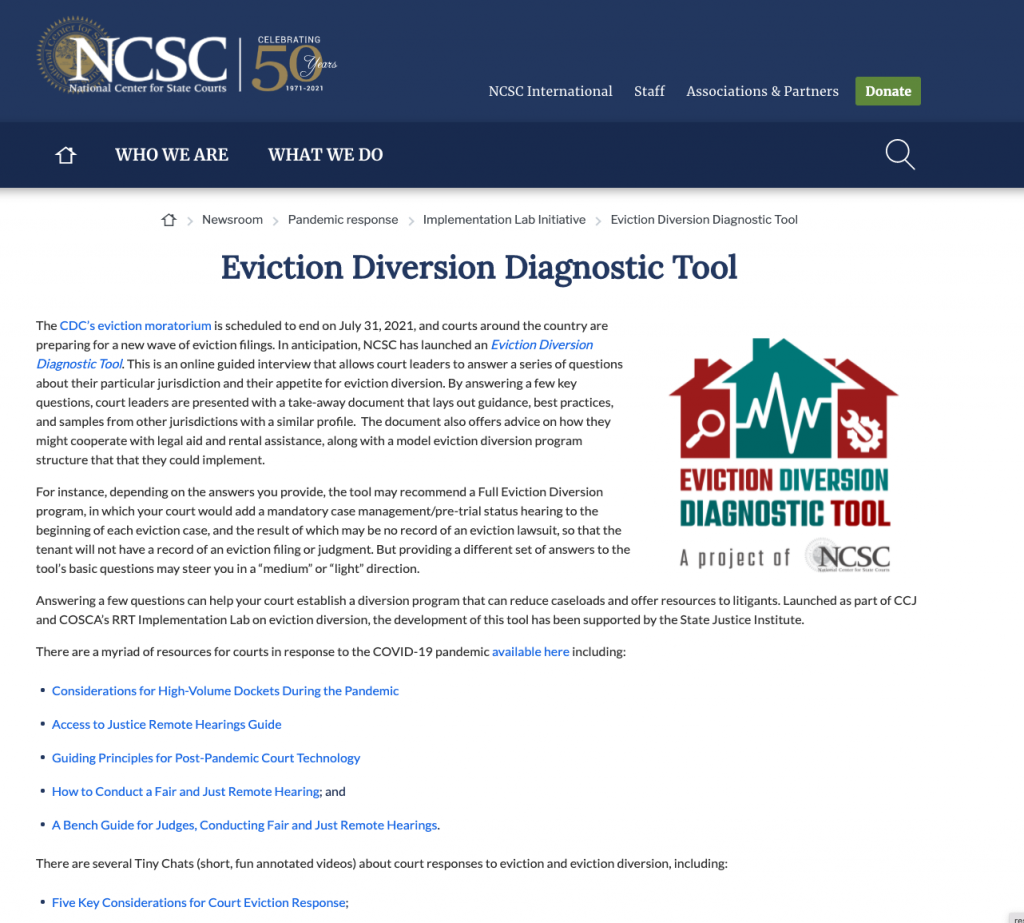
Examples of court-based eviction diversion programs
See this report from the National Center for State Courts on eviction diversion programs working from 2022-2024, to develop sustainable models.
Also see existing and earlier court diversion and prevention programs (some of which may be outdated as funding from COVID relief runs out):
- In Philadelphia: the Philadelphia Eviction Prevention Project, which also includes other services like a helpline for tenants, training workshops, a legal help website, and connections to legal services. Also see the PHL Eviction Diversion program.
- Las Vegas Eviction Diversion Program
- Indianapolis Eviction Diversion Program in Lawrence Township Small Claims Court, Marion County
- Texas Judicial Branch eviction diversion program (TEDP)
- In Kalamazoo: the 8th District Court Eviction Diversion Program
- In Grand Rapids: the Eviction Prevention Program pilot in the 61st District Court
- In Massachusetts, the HomeStart Eviction Prevention program
- In Phoenix: the Arizona Department of Housing’s Eviction Prevention Assistance, along with an article about its roll-out
- In Connecticut: the Eviction and Foreclosure Prevention Program
- In Cook County: Early Resolution Program as part of Legal Aid for Housing and Debt
- In Jacksonville, FL: the Emergency Assistance Program from the city’s Social Service Division
Court Data Gathering & Exchanges
Courts can better gather, track, and share data. This can improve the early delivery of services to prevent evictions and associated harms. This data work can also help policy-makers better spot trends in evictions, and make better rules, laws, and programs to get to fundamental solutions.
Some examples of data work that courts can do:
- Establish a data exchange with local service providers (like legal aid, social services, housing navigators, mediators, and/or Eviction Diversion Program leaders). Once an eviction action is filed, the court can make the public court record details available to these service providers. These providers can then promptly reach out to the litigants with offers of services, to help them resolve their dispute and get needed services.
- Track filings and outcomes to know what’s happening. This can include demographic information, zip code, and other location data about the landlord and the tenant, amount of rent in question, settlement terms, and other data. This can help policymakers know where evictions are happening, with what kinds of people involved, and with what kinds of outcomes.
See more from a New America-led coalition on Eviction Data recommendations, about what kinds of data to collect and how to set up safe, secure sharing of it.
Court Notices, Summons, and other Outreach
The official documents that come from the court to litigants are a key opportunity for help. They can make the process clear, or make it intimidating and confusing. They can direct people to resources, or make it hard to figure out what to do.
See examples of improved court summons & fliers here:
Courts can use good document design, and messaging strategies that nudge people to attend hearings and use services. See this example from the Hamilton County Courts in Ohio, in which a traditional eviction Summons was transformed through a collaborative design process with tenants, landlords, advocates, and court administrators. This work was led by the Stanford Legal Design Lab. If you would like to use this same Summons model, please be in touch to get the source file.
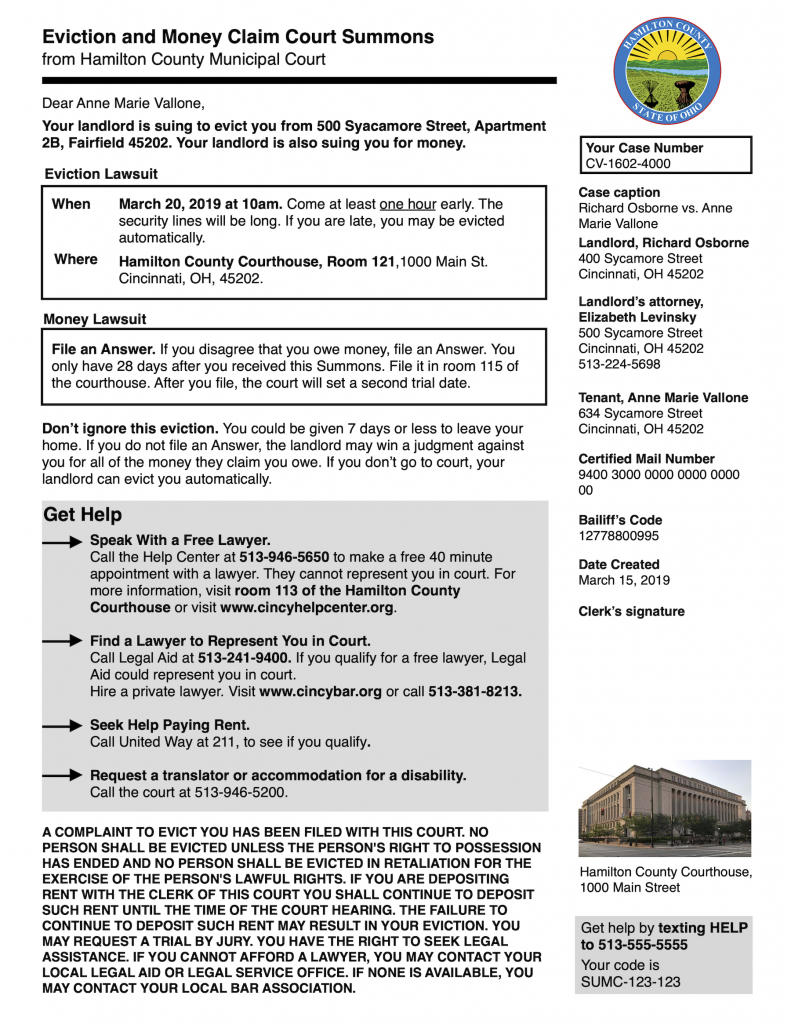
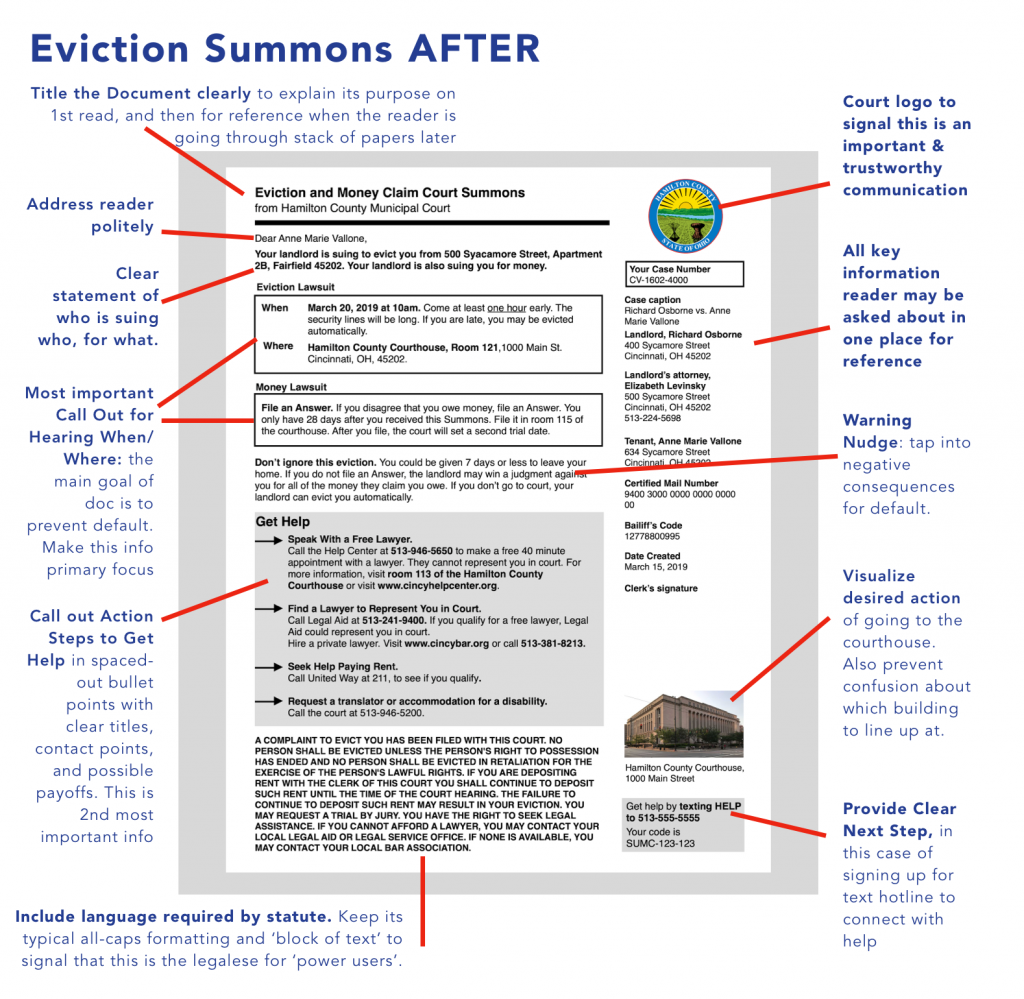
Courts might also standardize Settlement Agreements by distributing a standard, best practice agreement form for use in their courtroom. This may prevent oppressive settlement terms from being entered into the agreement.
Court Procedure and Rules that Mitigate Eviction Harms
In many courts, evictions happen very quickly. In some cases, tenants have only a few days to respond to an eviction lawsuit. If they don’t formally answer the complaint, they never get a hearing in court.
This type of ‘fast’ court procedure (with tight deadlines, extra requirements on the defendant to get a hearing, no pre-trial conferences, and high rates of default) make it very hard to prevent an eviction judgment — even if a person has lawful defenses, or the chance to pay back-rent from rental assistance funds.
Slowing down the eviction court procedure, as recommended by the Department of Justice’s Assoc. Attorney General in June 2021, can play a crucial role in preventing evictions, and allowing other prevention services to succeed. It can also stop harmful eviction orders from coming onto people’s records.
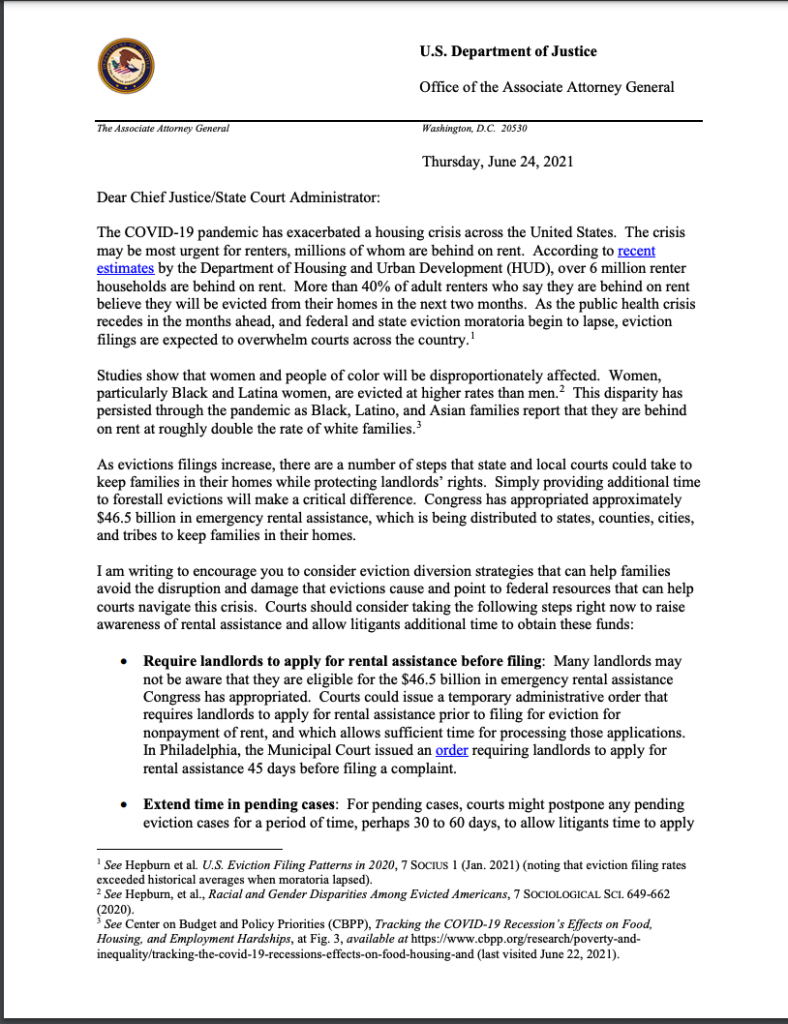
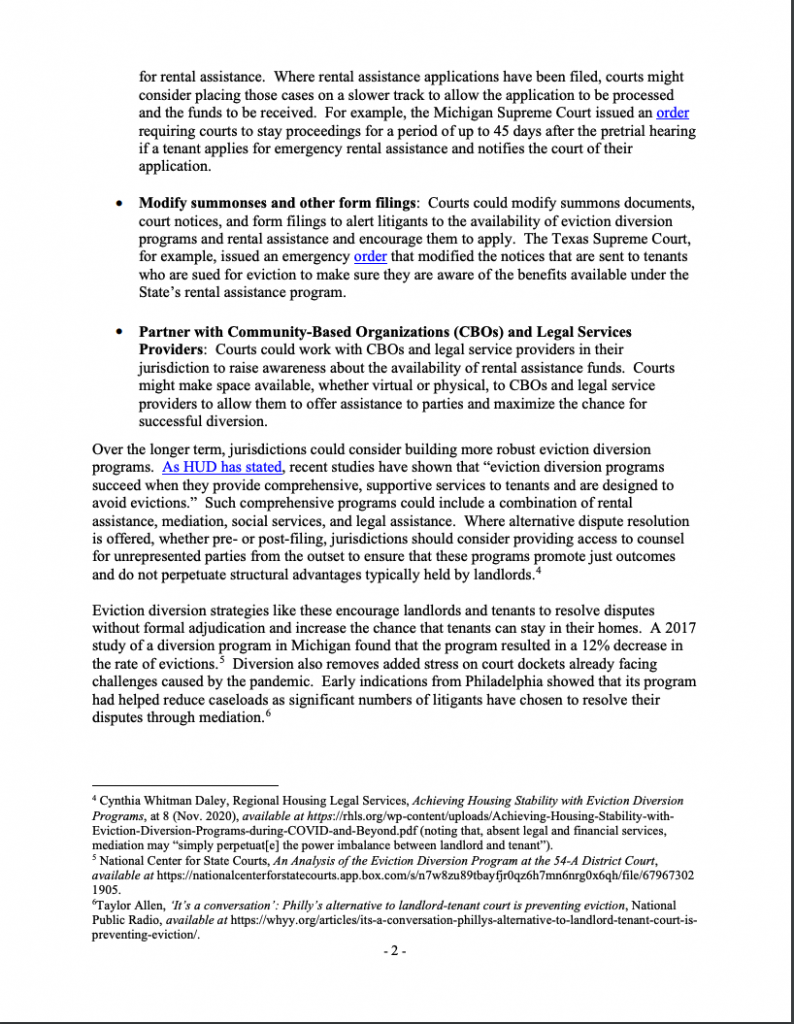
Specific court procedure options include:
- Extend the time that Tenants have to respond to an eviction complaint filed against them. This can help give them more time to apply for services, get help paying rent, and engage in mediation to divert the case away from a trial and order.
- Put a case on a Slower Track while waiting for Rental Assistance. Many jurisdictions struggle to quickly respond to tenant and landlords’ applications for rental assistance. Rather than let a case about unpaid rent go to trial and judgment, instead, a court can delay the trial date until there is a decision about the rent assistance. See the state of Michigan’s order on slowing down the docket to await rental assistance help.
- Mandatory pre-trial conferences with the judge. Courts can take a stronger role in encouraging use of eviction diversion programs, settlement through mediation, and other solutions aside from going to trial. They can require all landlords and tenants to attend a meeting with the judge before the trial. This can let the judge and other court staff make sure both parties know their rights, the law, the services available to them, and the benefits of alternative disupte resolution.
- Require Landlords to file for Rental Assistance or use an Eviction Diversion Program before filing a lawsuit. Like in Philadelphia, these pre-filing requirements can ensure that all other avenues are exhausted before a landlord sues a tenant. This can help the parties get funding needed to cover the back-rent at the root of their dispute, or deal with other matters through the mediation of a new agreement.
- Raise the cost of filing for an eviction. Courts can set the filing fees, that determine how expensive it is to bring an action in court. Some jurisdictions have very low filing fees to bring an eviction action, making it attractive for landlords to use a lawsuit as a collection means. Even if the landlord doesn’t actually want to evict the tenant, but rather wants to ensure they get paid rent, the lawsuit process is cheap enough to be used for collections. If courts raise the cost of filing, this can discourage the over-use of the court system as a means of collections.
- Review settlement terms or have default settlement template so that tenants and landlords are not agreeing to abusive terms, that amount to a ‘civil probation’ in which a tenant can be forced to move
Court Technology Outreach & Self-Help
Courts can improve litigants’ legal capability and empowerment by having a strong technology plan. This includes for communicating with landlords and tenants about court details. It also covers providing self-help materials in convenient, digital channels (as well as in-person and paper-based help).
- Text message reminders. Courts should be collecting cell phone numbers for litigants, and then sending automated reminders for deadlines around paper filing requirements, hearing dates and locations, and other key procedural points they need to know and follow through on. Text message reminders have been proven very effective in increasing participation in court proceedings.
- Self-help website from the court on the Eviction Process. Every local and state court should have a public-facing website page with self-help resources. This includes the basic contact details of the court, where to come to, how to prepare for a hearing or case conference, and what to expect on during one’s case. It should also provide step-by-step guides, FAQ answers, and other self-help material to support those without lawyers to navigate the process on their own. This website should be technically modern, with a user-friendly design, and optimized for SEO so that it appears high on search results. See more at Stanford’s Legal Help Dashboard on how to set up an effective self-help website. Visit Cincinnati’s Eviction help website from the Hamilton County Courts for an example of an effective self-help court website for eviction.
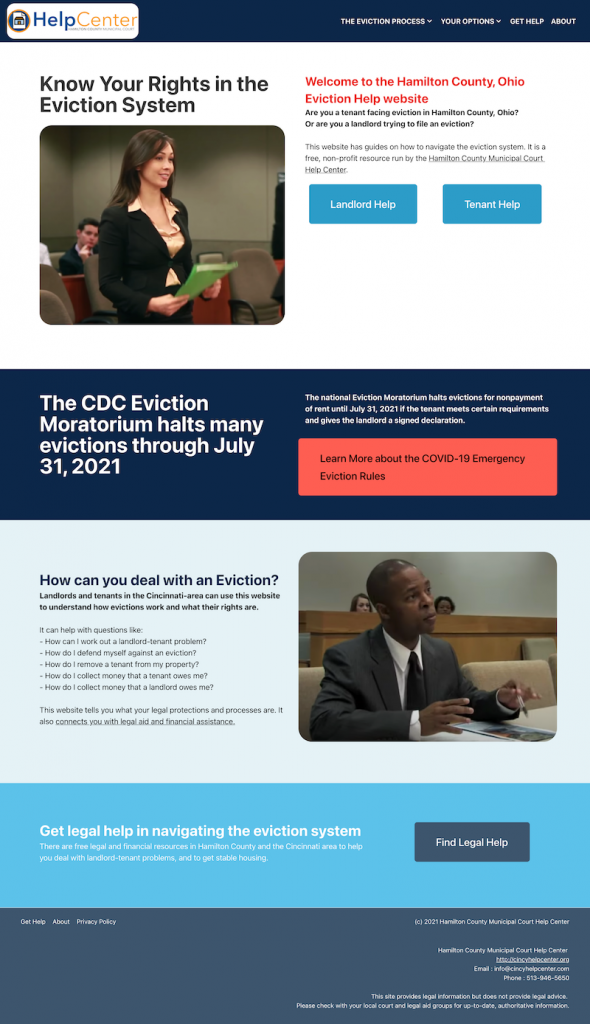
Collaborative Housing Courts
Judges and court administrators can change how eviction trials are run, courtrooms are set up, and what kinds of professionals are in the room during a hearing.
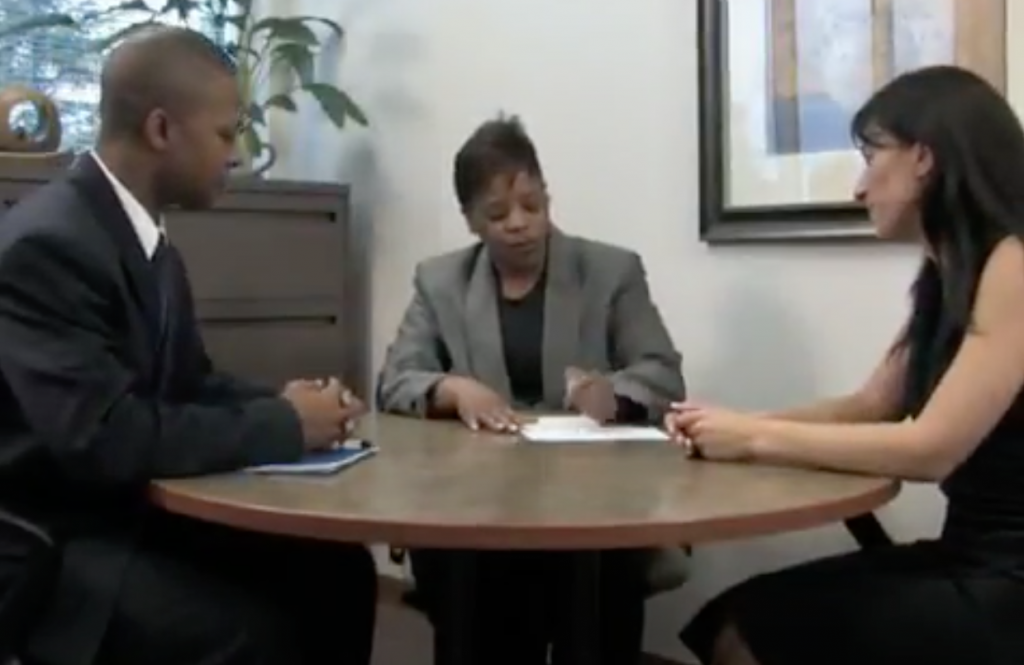
Just as there have been collaborative and problem-solving courts in other areas of the law — like for homeless, veterans, mental health, and other areas — there can be similar models for eviction and housing.
- Train judges to manage the landlord-tenant docket with social awareness and cultural competencies. Judges can be educated in the ramifications of evictions (like around health, education, mental health, domestic violence, and equity). They can also be educated in landlord-tenant and fair housing law (in case they are not already specialized in this area). In addition, they can be supported to know how proactive they can be in a court hearing, especially when there is a power imbalance between parties and high stakes for the outcome. These types of training can ensure that the hearing is respectful to all parties, oriented towards problem-solving, ensuring that the law is followed, and that all parties are empowered and have a sense of procedural justice.
- Have protocol to refer litigants to social services, and have follow up through status conferences. This can allow judges or other court officers to bring in holistic community support services to address the root problems around finances, mental health, domestic violence, or other issues at play in the eviction dispute. It has the judges more closely supervising what happens in the dispute and in the outcomes — to help guide the parties towards housing stability.
- Some courts, like in Lousiville, have a dedicated social service provider in the eviction hearings, to ensure that litigants have signed up for all possible programs and to advise the judge on what other resources might be possible. This other professional can ensure that the process is more holistic and focused on getting stable housing and good social outcomes for the litigants involved.
- The judge also can take a proactive role in the hearing. This can be through ensuring that both parties know their rights, understand any stipulations they are making, have applied for all related services, and are using any defenses or protections (like the CDC Eviction Moratorium) they might have. This can also be through the judge reaching out to tenants who have failed to appear, by calling them and determining if they can participate via telephone to ensure that they do not default and that they make full use of the hearing.
Some examples of collaborative housing courts
- Red Hook Community Justice Center in Brooklyn, NY (read its origin story),
- Harlem Community Justice Center
- Rochester, NY is considering a new housing court model, that would allow the court to make orders to landlord about habitability; allow tenants to represent themselves more easily; and have more court-supervised administrators following up to make sure necessary changes are made
Examples of court-based eviction initiatives

Introduction to Civil Diversion in courts
The National Center for State Courts has a hands-on, detailed webinar that guides courts & community partners on Civil Diversion programs. This covers eviction diversion programs, as well as similar programs for other case types (like foreclosure diversion). Here’s more from the National Center for State Courts description: A growing majority of civil cases in…
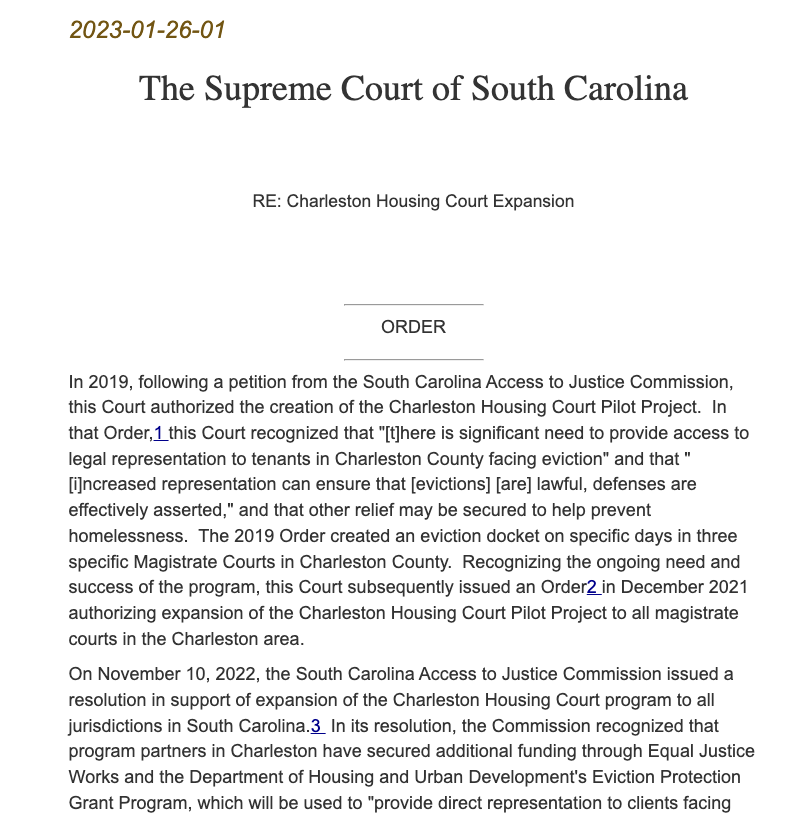
Housing Courts in Charleston, South Carolina
New Housing Court models have emerged out of Charleston, South Carolina, where stakeholders have created a program hosted in the court to get more access to legal representation to eligible tenants, to help them avoid evictions.
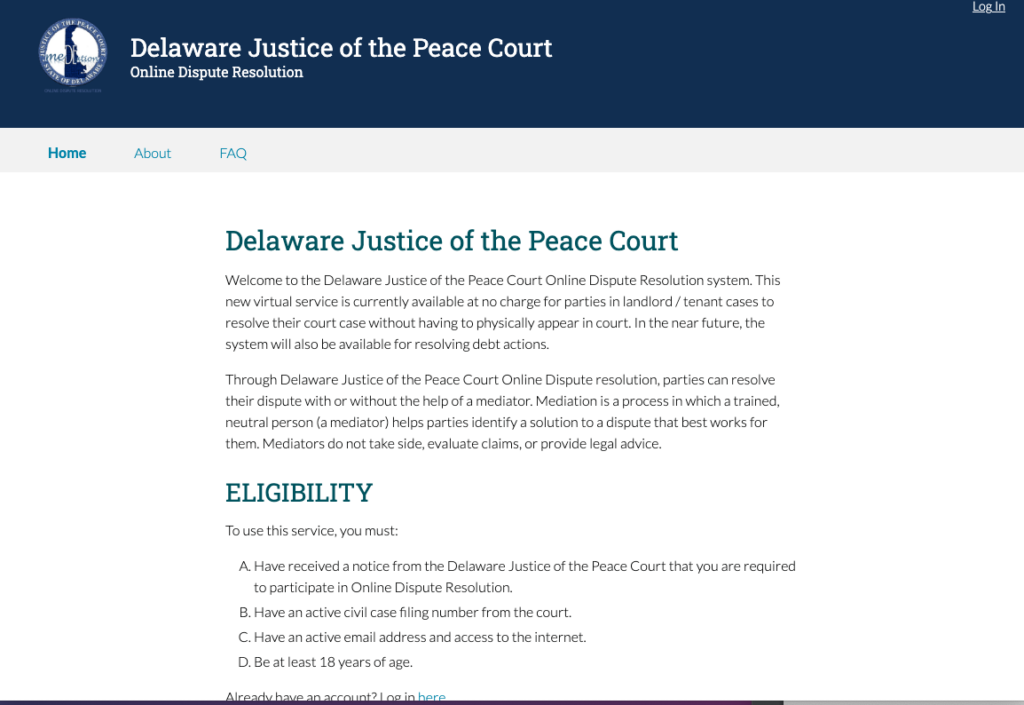
Online Dispute Resolution for landlord-tenant court in Delaware
Delaware Justice of the Peace court may be the first in the nation to launch an online platform for landlords & tenants to resolve their case without going to court in person. This Landlord-Tenant ODR system is built by Matterhorn (a Court Innovations company). https://cii2.courtinnovations.com/DEJPCOURT The ODR system allows for online mediation. In some cases…
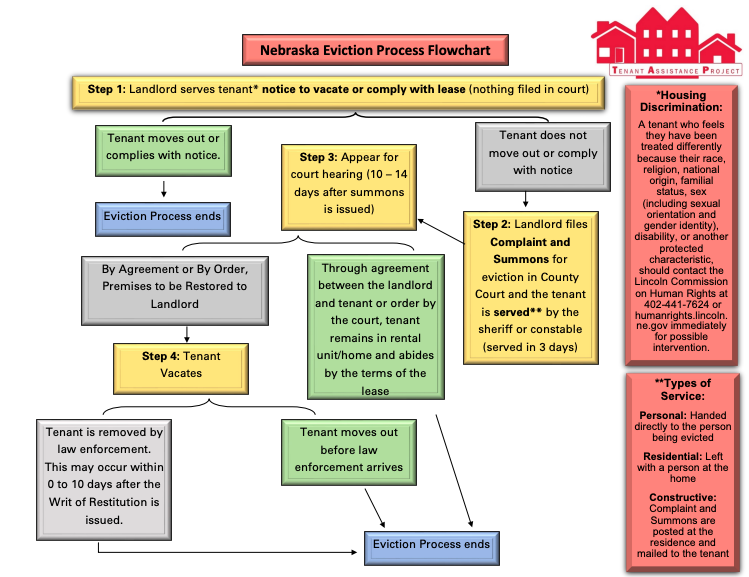
Tenant Assistance Project in Nebraska
Some counties in Nebraska have started a comprehensive court-based program to connect tenants with attorneys, resources, eviction defense strategies, and procedural coaching. This can stop immediate evictions.
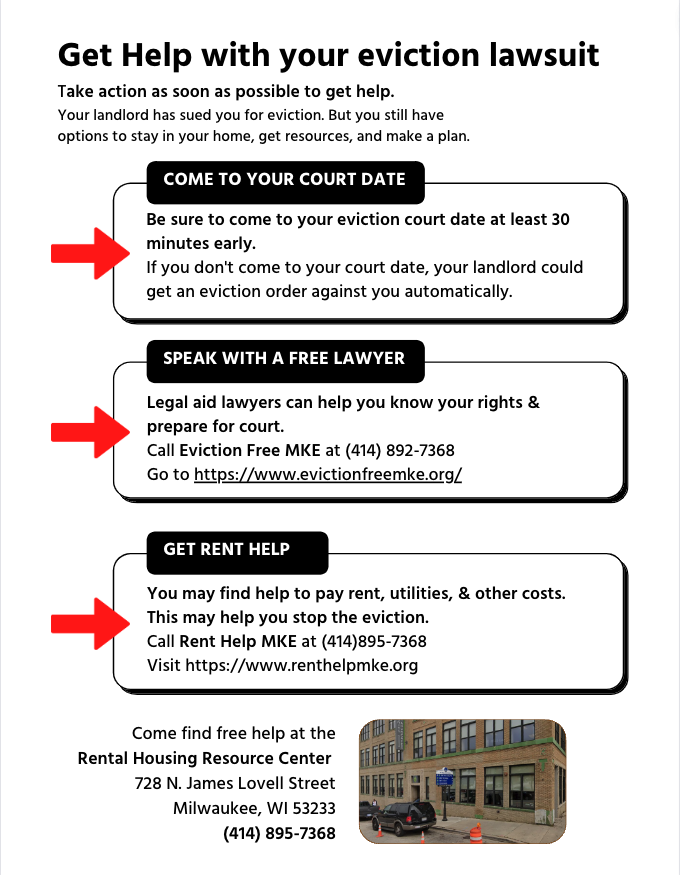
Eviction Help Flier
Make sure a tenant who has been sued for eviction also knows their options to get help & be prepared for court.
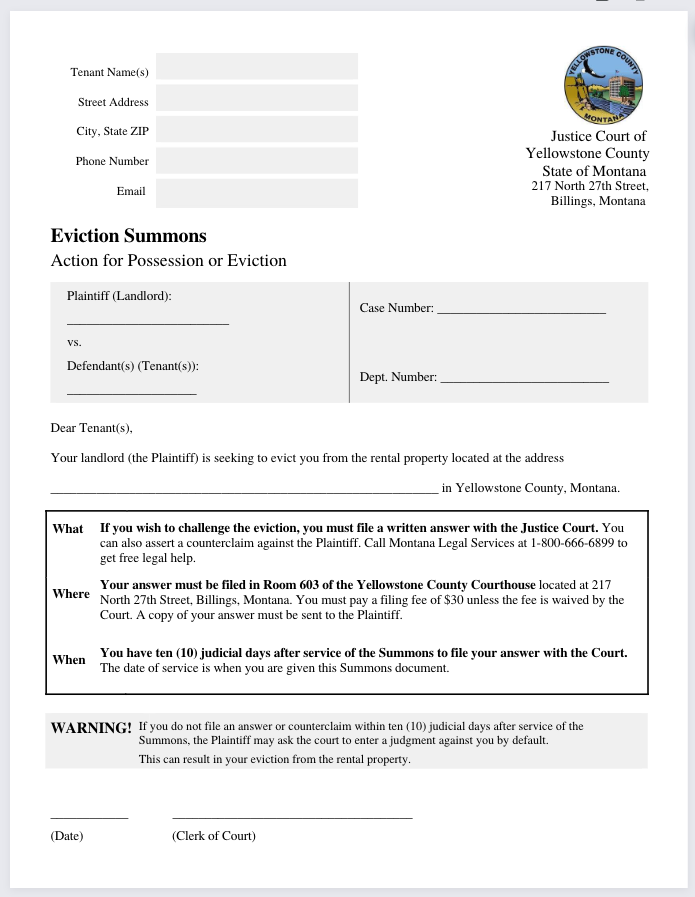
Eviction Court Summons from Montana
When a person is sued for eviction, how are they notified? A court summons is a crucial document to let them know about the lawsuit, help them connect with services, and get them prepared for important hearings and deadlines. This court summons was designed to be more user-friendly & accessible.
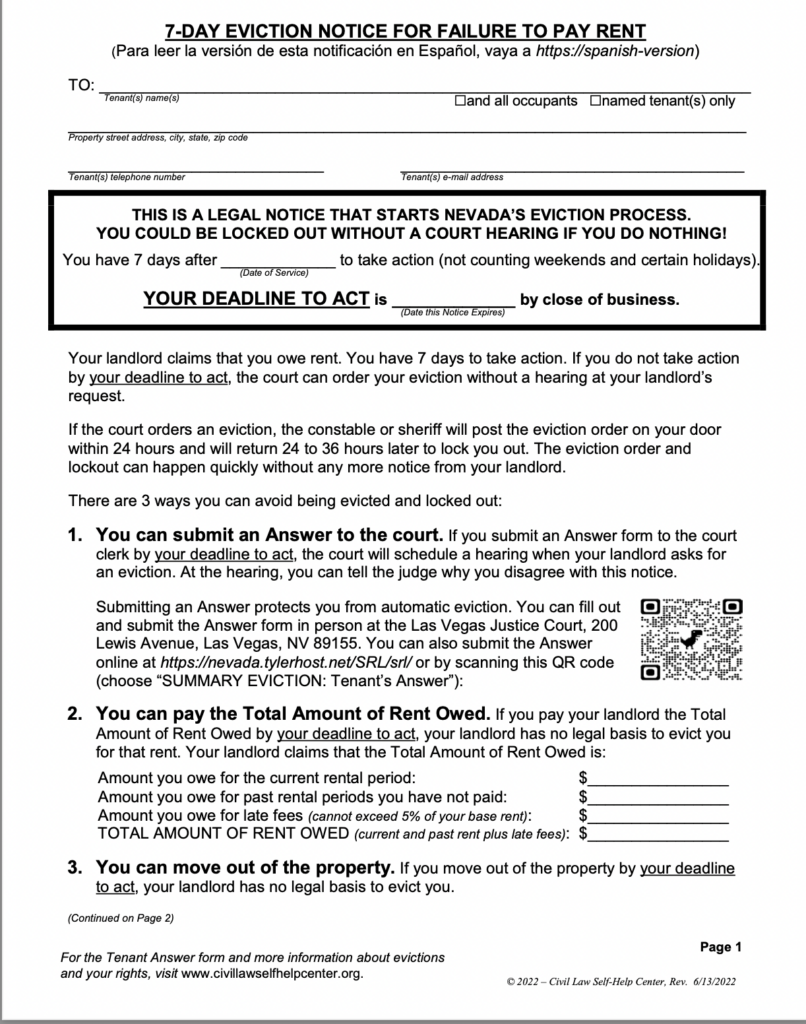
Eviction Notice design from Las Vegas
How can courts and legal actors warn a tenant about a possible eviction –so that they take action, connect with services, and avoid a forcible move? This new warning notice from Las Vegas is one example of a strategic, simplified design.
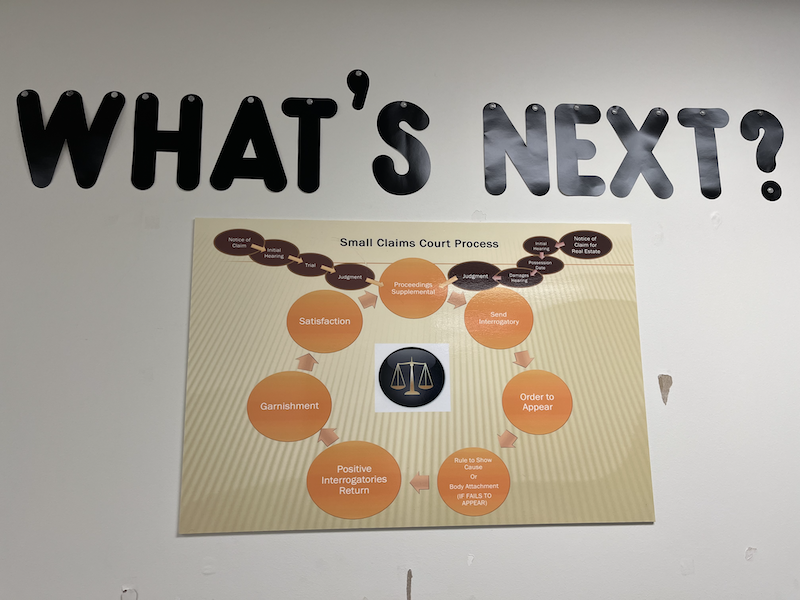
Housing Court Service Design in Indiana
Samira Nazem at National Center for State Court highlighted some innovations at local courts in Lawrence Township, Indiana in Marion County. They have worked to create more visual, supportive guides throughout the in-person court process for tenants and landlords looking for help. These DIY efforts are cost-effective but impactful, because they provide user-friendly signposts and…
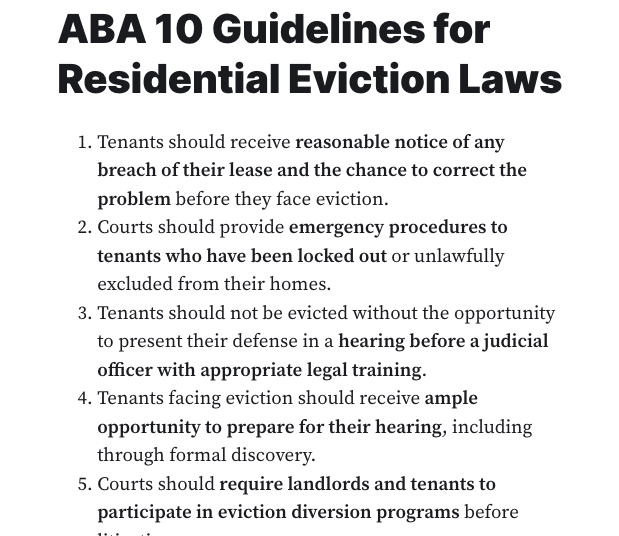
ABA Guidelines on Eviction Law
The American Bar Association has put out 10 Guidelines for Eviction Law, to guide local leaders in how to establish legal protections, due process, and diversion programs.
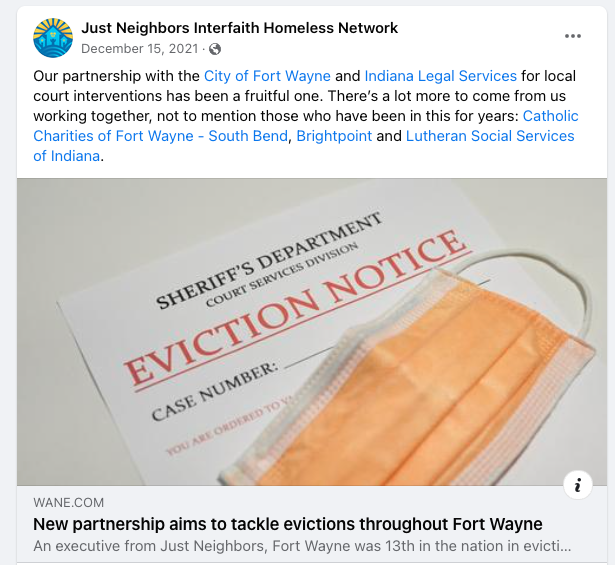
Eviction Intervention in the court house in Fort Wayne
A unique partnership in the Indiana town of Fort Wayne has created an in-court eviction prevention service to reach more tenants and landlords before they go to trial, with services and guidance that can help them come to a resolution and get financial help without going to court.

Texting tenants immediately after lawsuit is filed
Courts, legal aid groups, and diversion programs are using text messages to send reminders, referrals, and encouragement to tenants to participate in court and avoid eviction
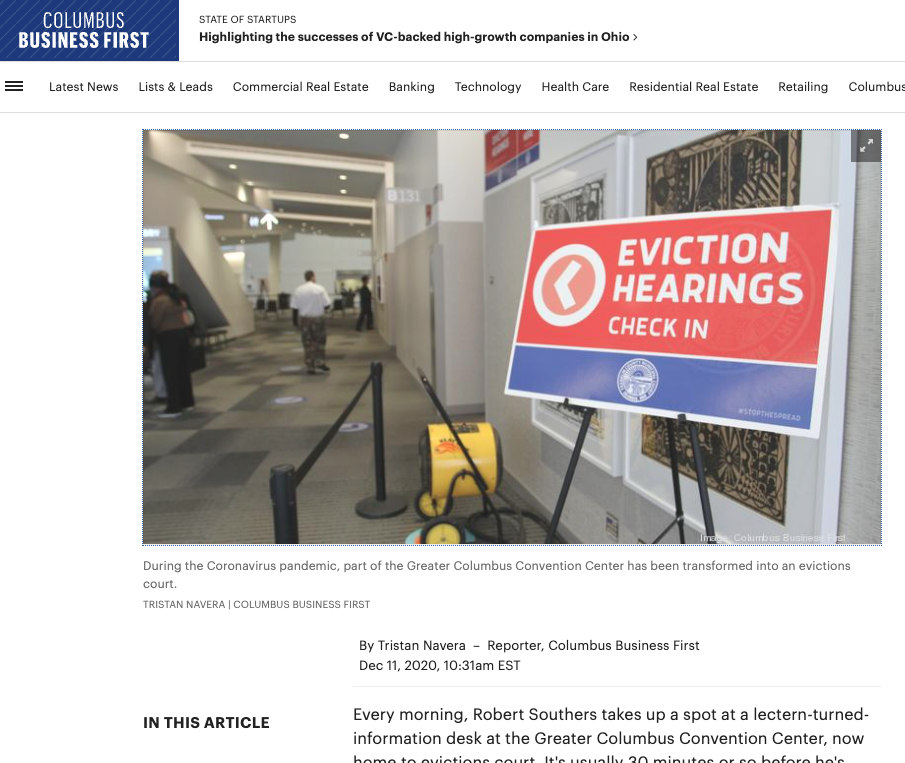
Social Work Navigators at eviction court in Ohio
Social worker navigators are a new way to connect tenants and landlords with important assistance to resolve their problems when they visit court. They can also help court leaders make smarter referrals to get to better outcomes.
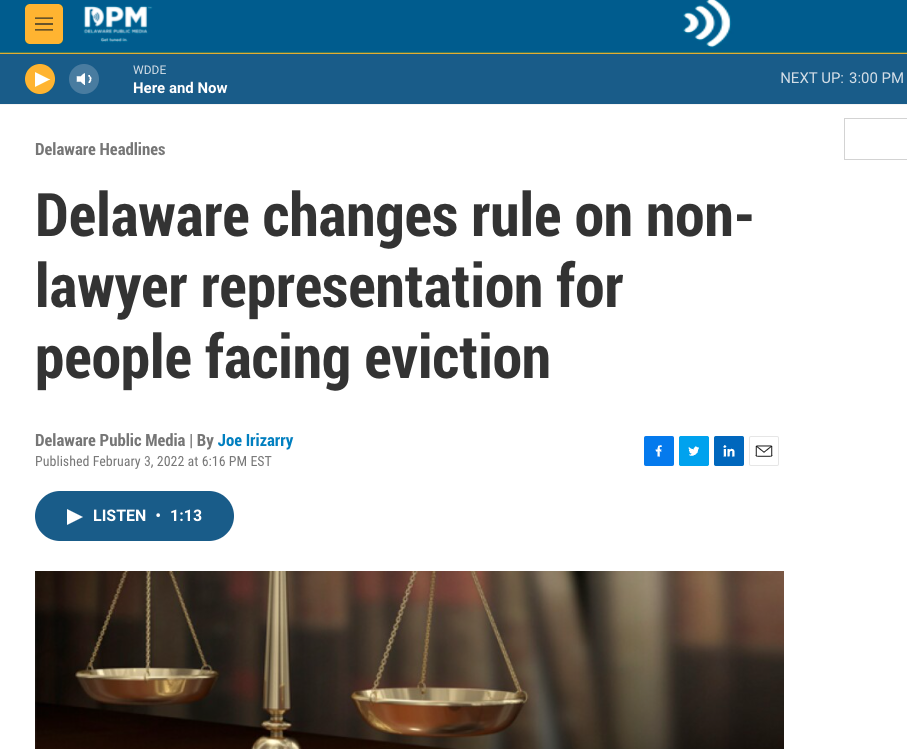
Qualified Tenant Advocates to represent tenants in courts
The Delaware Supreme Court established a new policy that allows non-lawyers — in this case, approved Qualified Tenant Advocates — to represent tenants in eviction court. This is only for residential tenants (not commercial ones). Usually, only licensed lawyers are allowed to represent tenants in the Delaware eviction courts, called Justice of the Peace Court….
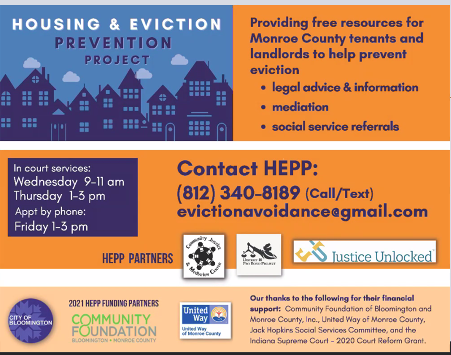
Online court mediation & services in Monroe County, Indiana
The Housing & Eviction Prevention Project (HEPP) in Indiana provides free legal, mediation, and social services to court. It includes integration into the court process, so once people are facing an eviction trial, they may be linked to services that can help them resolve their problem out of court.
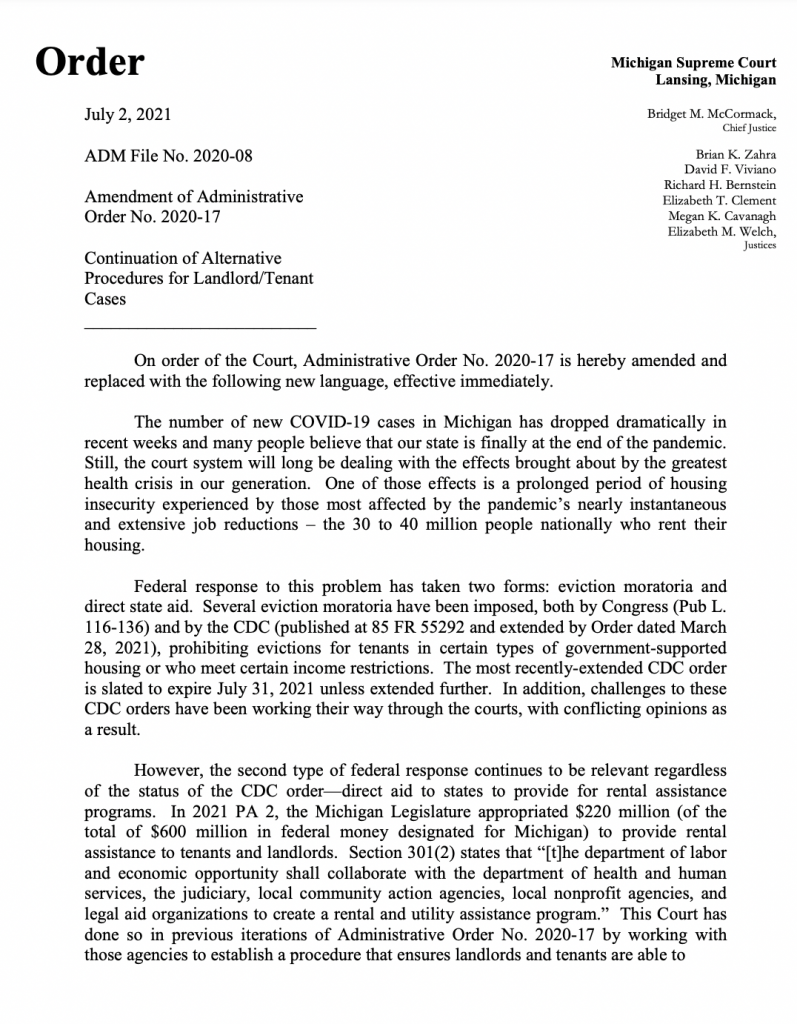
Michigan eviction court procedure reforms
The Michigan state courts have created new court rules that help to slow down eviction cases, direct more landlords and tenants to rent assistance, and encourage the court to help the parties to resolve their dispute without going to trial.
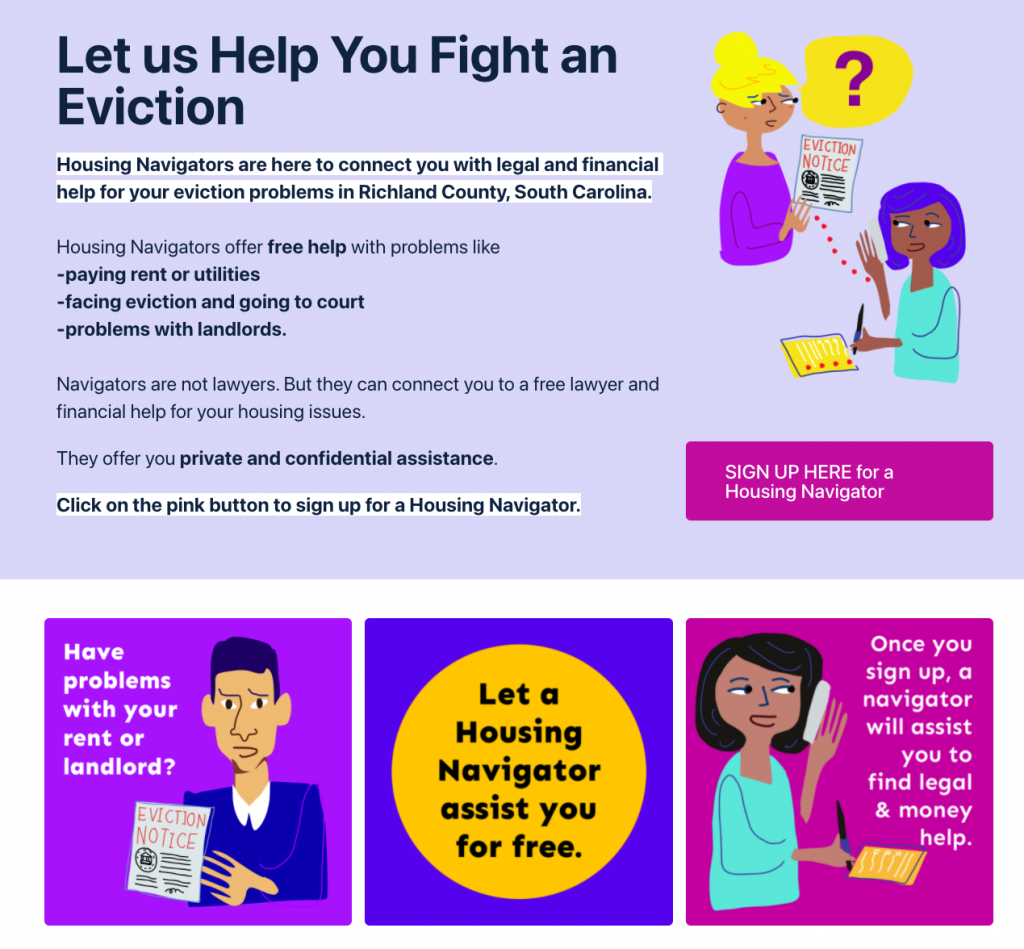
NAACP eviction navigators & diversion program in South Carolina
This new South Carolina pilot from the NAACP and other local partners combines various prevention and help services for tenants and landlords at risk of eviction.
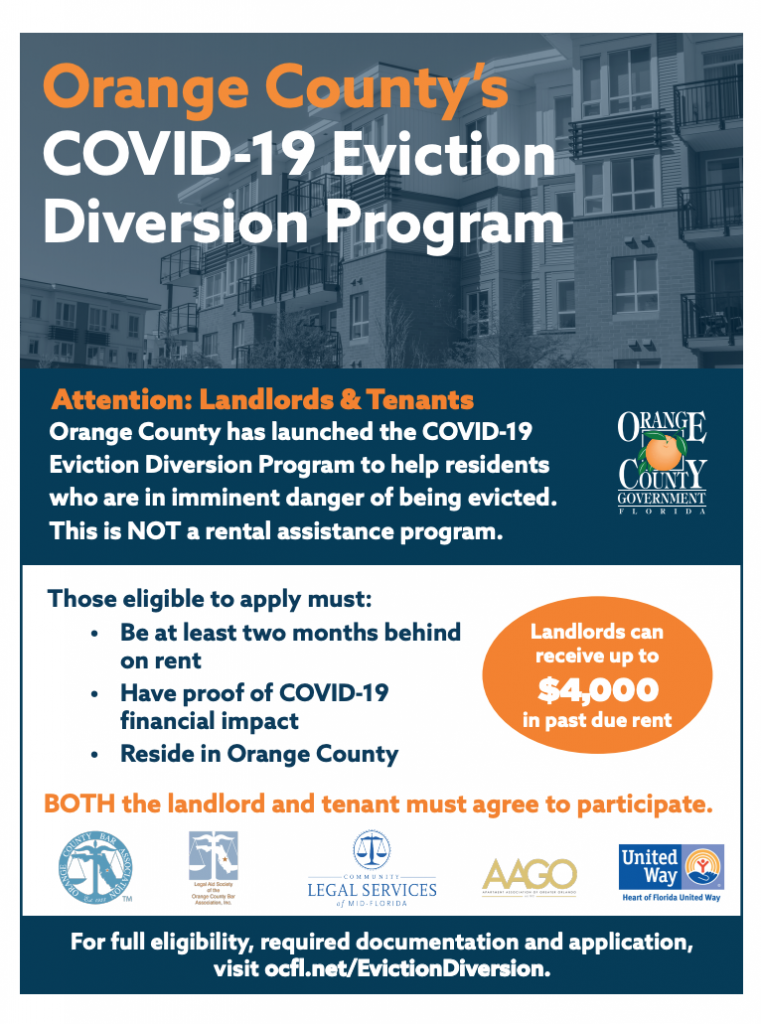
Orange County, Florida eviction diversion program
In an effort to help curb evictions due to the COVID-19 pandemic, the Orange County Board of County Commissioners created the Orange County COVID-19 Eviction Diversion Program. The $13.3 million program is funded by the Federal CARES Act monies.
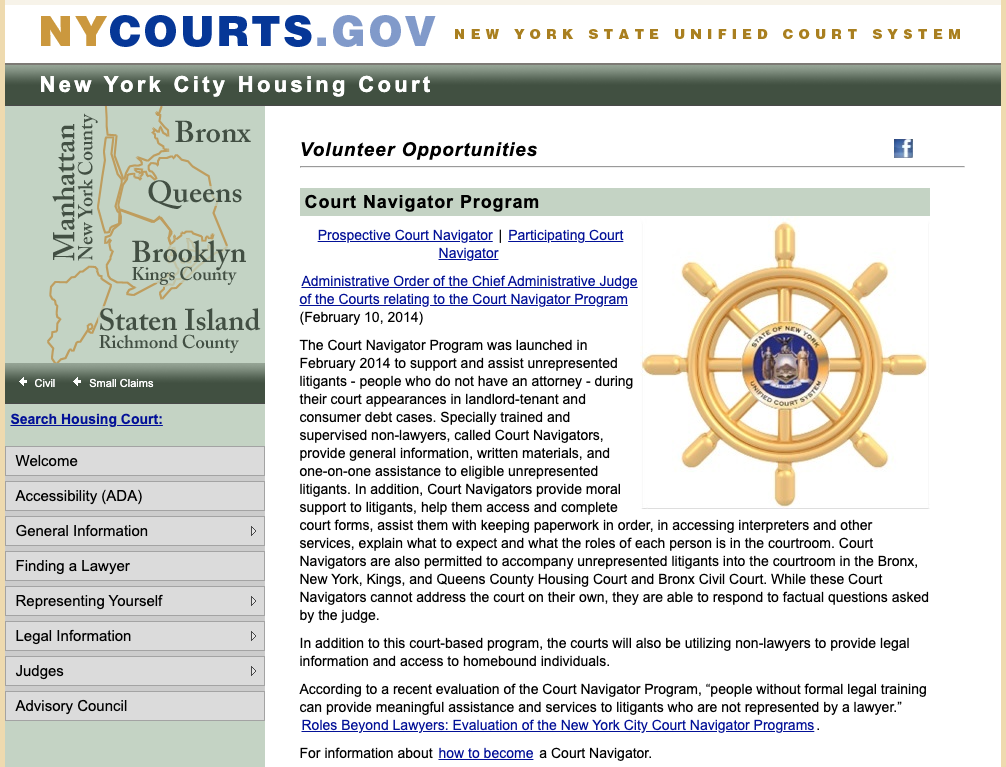
NYC Housing Court Navigators
The New York City Housing Courts has a navigator program to support and assist unrepresented litigants – people who do not have an attorney – during their court appearances in landlord-tenant and consumer debt cases.

Eviction Diversion Program in Pinellas County, Florida
Renters and landlords in Pinellas County, Florida are eligible for a COVID-19 Eviction Diversion Program to help them reach a mutual agreement, pay back-rent, get help with stable housing and financial assistance, and navigate social services. It is run by the Community Law Program in the county.
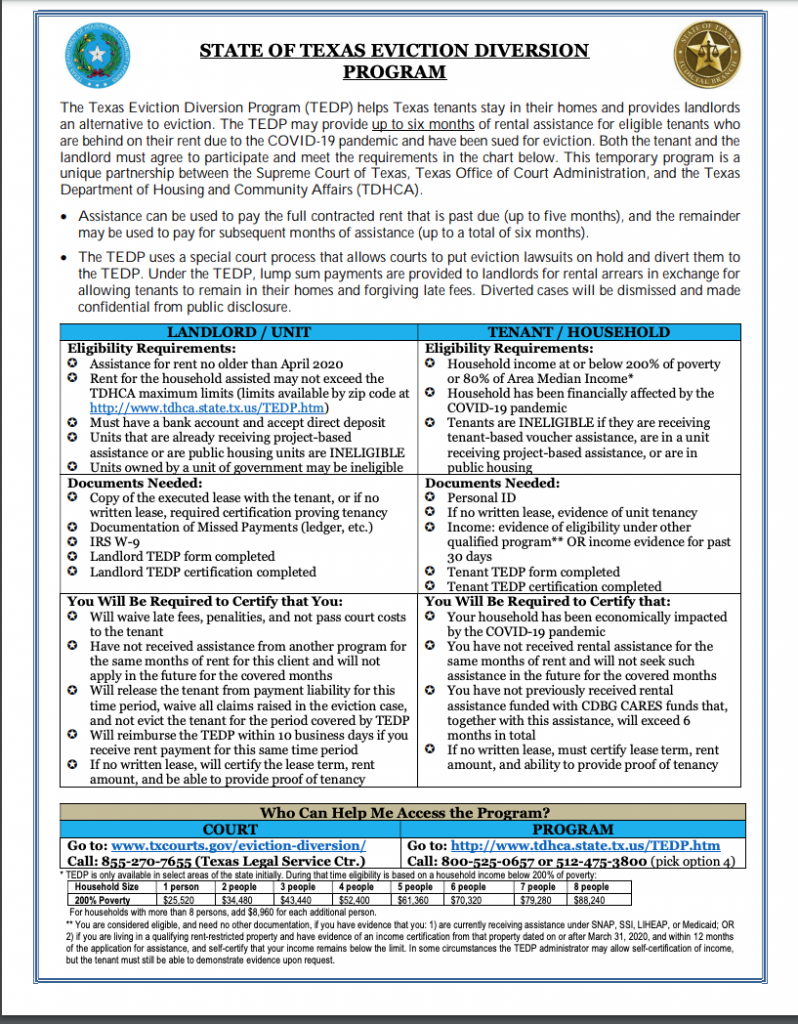
Texas statewide Eviction Diversion Program
The new Texas statewide eviction diversion program offers help during COVID-19 to renters and landlords. It applies once a lawsuit has been filed, and tenants are behind on rent.
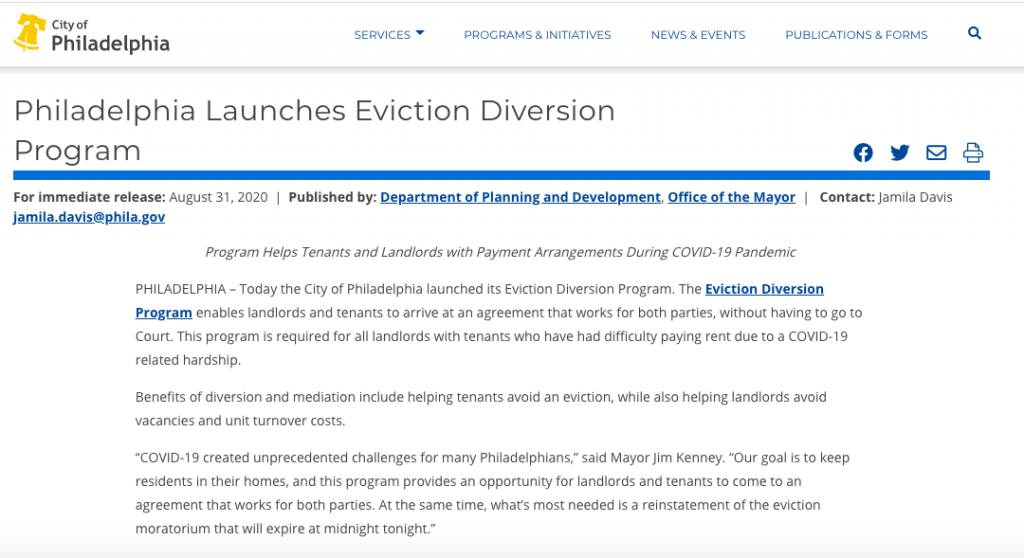
PHL Eviction Diversion Program in Philadelphia
The Philadelphia City Council has created an Eviction Diversion Program to help them mediate to a solution during COVID-19 hardships. It is to avoid court processes and eviction judgments.
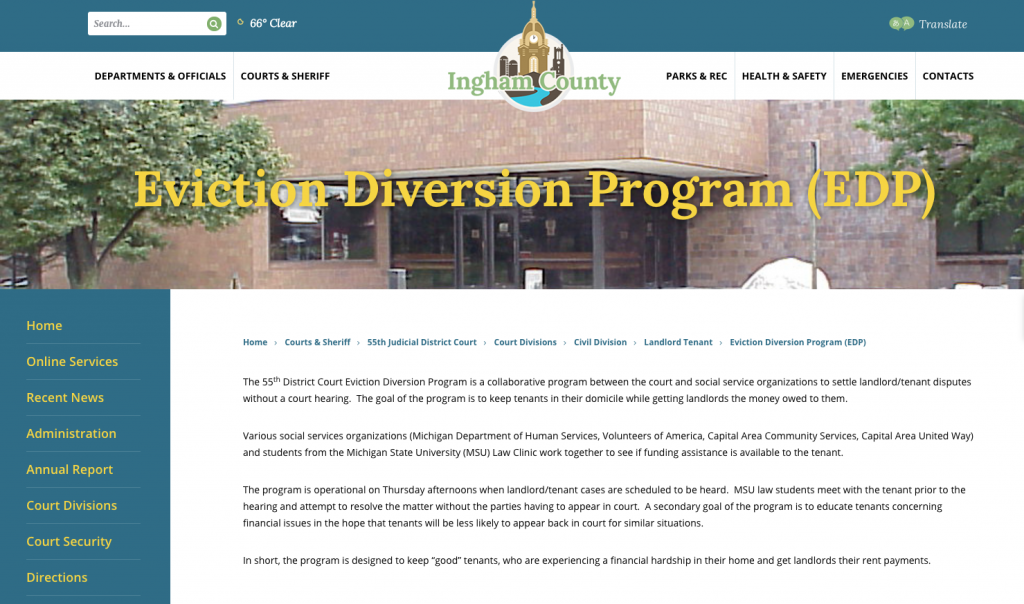
Eviction Diversion Program in Ingham County, MI
The court in Ingham County, Michigan has an Eviction Diversion Program to try to resolve eviction lawsuits and keep tenants housed.

Pittsburgh’s Eviction Diversion through Mediation Program
The city of Pittsburgh is launching an Eviction Diversion through Mediation program. This program offers free mediation services for landlords and tenants prior to filing for an eviction. It provides the same services for cases that have been filed but have not yet been granted a judgment.
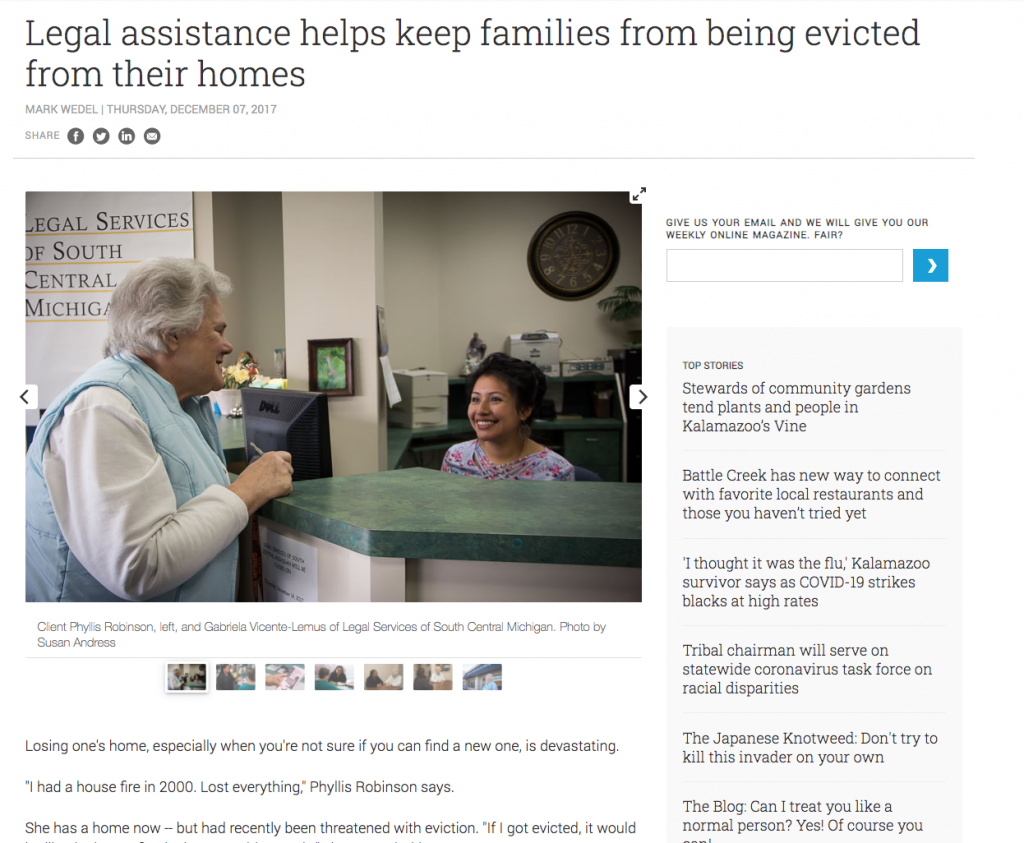
Eviction Diversion Program in Jackson County, MI
Jackson County, Michigan has an Eviction Diversion Program that lets tenants opt into the program, have mediation, legal services, and emergency assistance if they qualify. The goal is to help deal with underlying issues in the landlord-tenant relationship, and the holistic set of problems the tenant is dealing with.
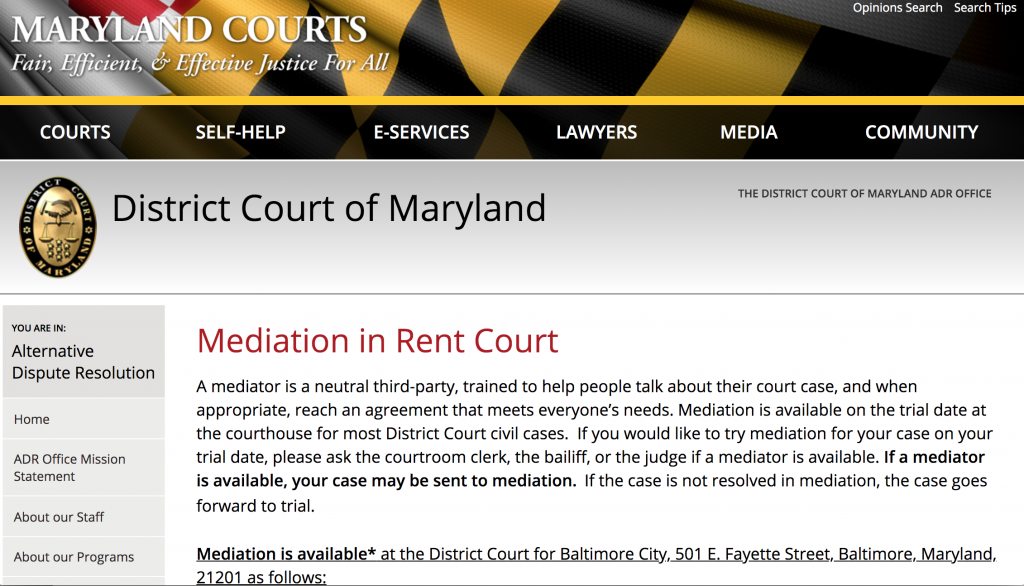
Rent Court Mediation in Maryland
Baltimore Rent Court offers an in-court Mediation program for landlord-tenant issues. They provide a free 3rd party neutral to help the parties come to a settlement and avoid going to trial.
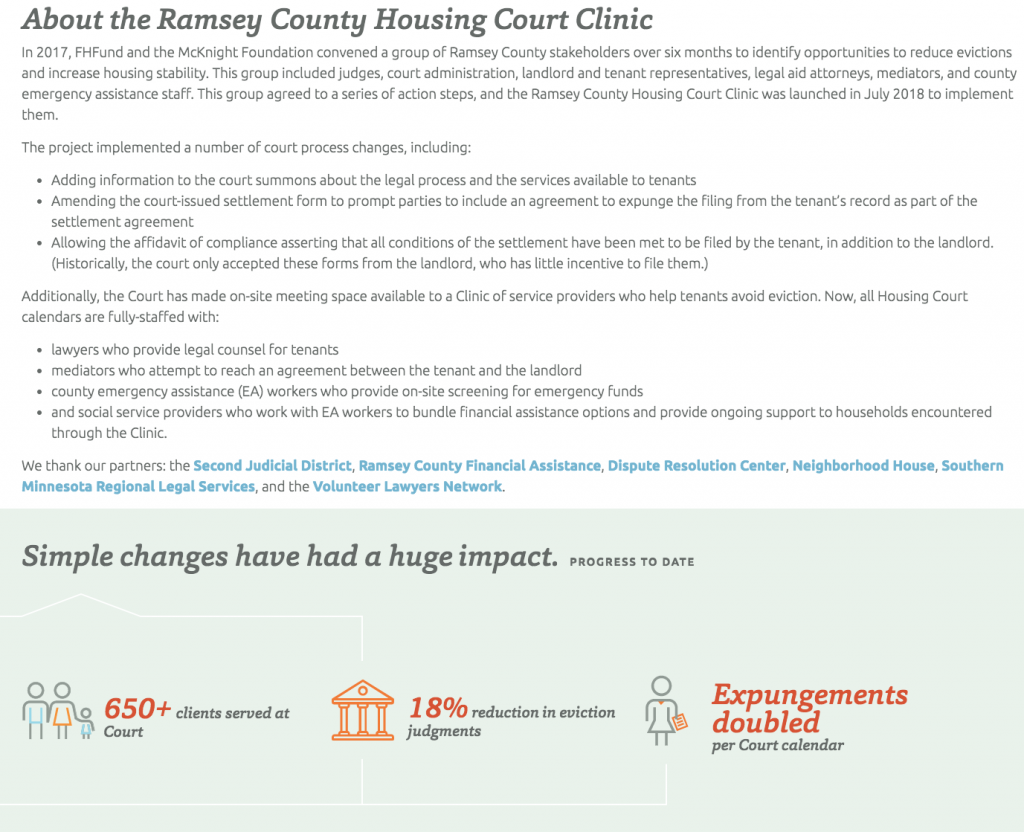
One-Stop Eviction Diversion Clinics at Housing Court & Neighborhood Centers in Minnesota
The Housing Court Clinic offers a suite of legal, dispute resolution, and financial help to tenants, as well as streamlined court process to help prevent evictions. The clinic has expanded to a Pre-Eviction neighborhood Crisis Clinic, to get the same co-located, holistic resources to tenants at a preventative stage.
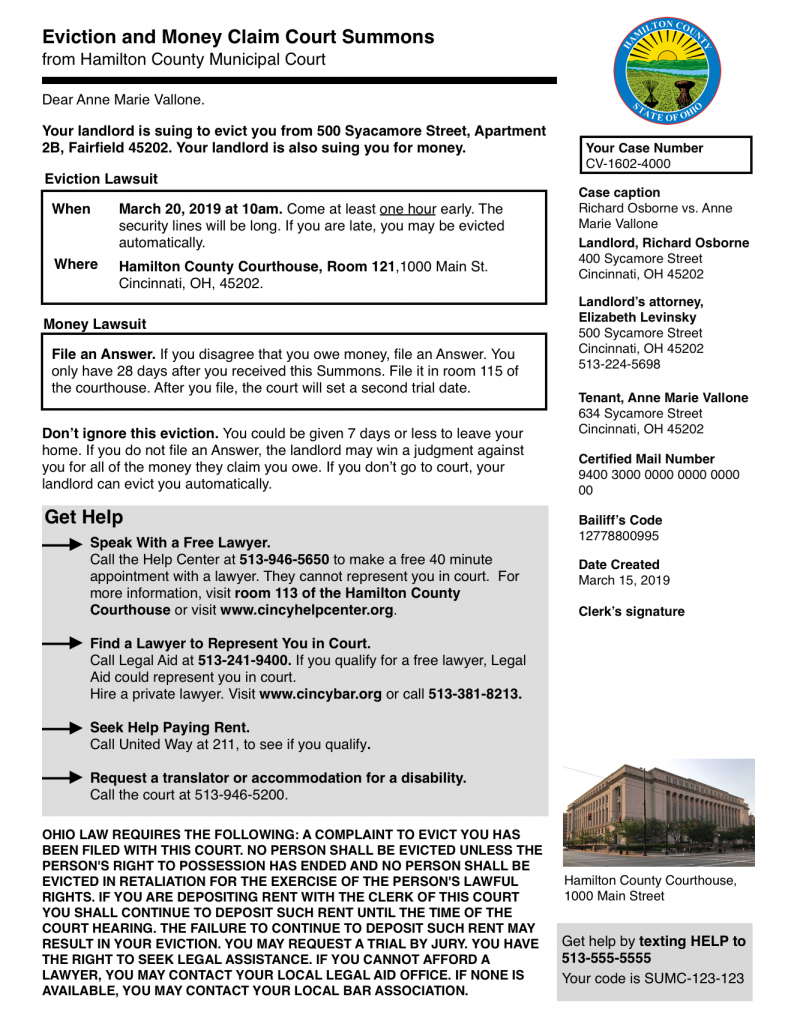
Eviction Summons Redesign in Cincinnati, OH
A team of court officials, self-help lawyers, and university researchers redesigned the court’s official Summons that tenants receive when they are evicted, to make it more accessible and actionable.
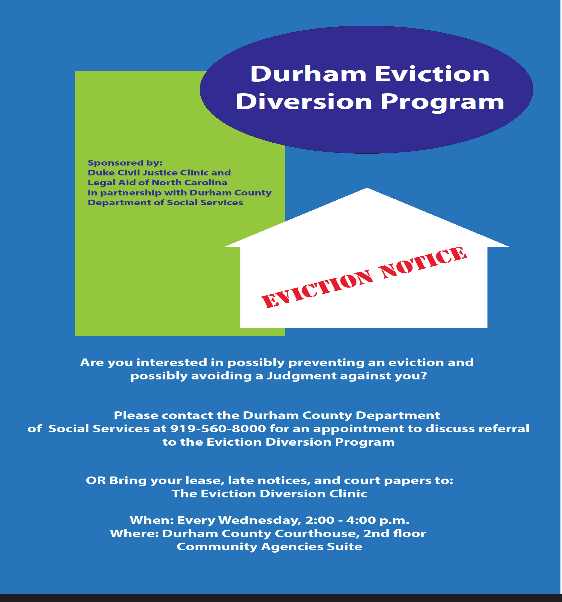
Eviction Diversion Program in Durham, NC
This program provides individuals facing eviction with free advice and support, ranging from emergency financial aid to legal council, with the goal of helping citizens avoid eviction judgements and decreasing the number of eviction filings and verdicts in Durham County.

Eviction Prevention in Syracuse, NY
The City of Syracuse Department of Neighborhood and Business Development invested in two eviction prevention programs focusing on early intervention services for tenants.
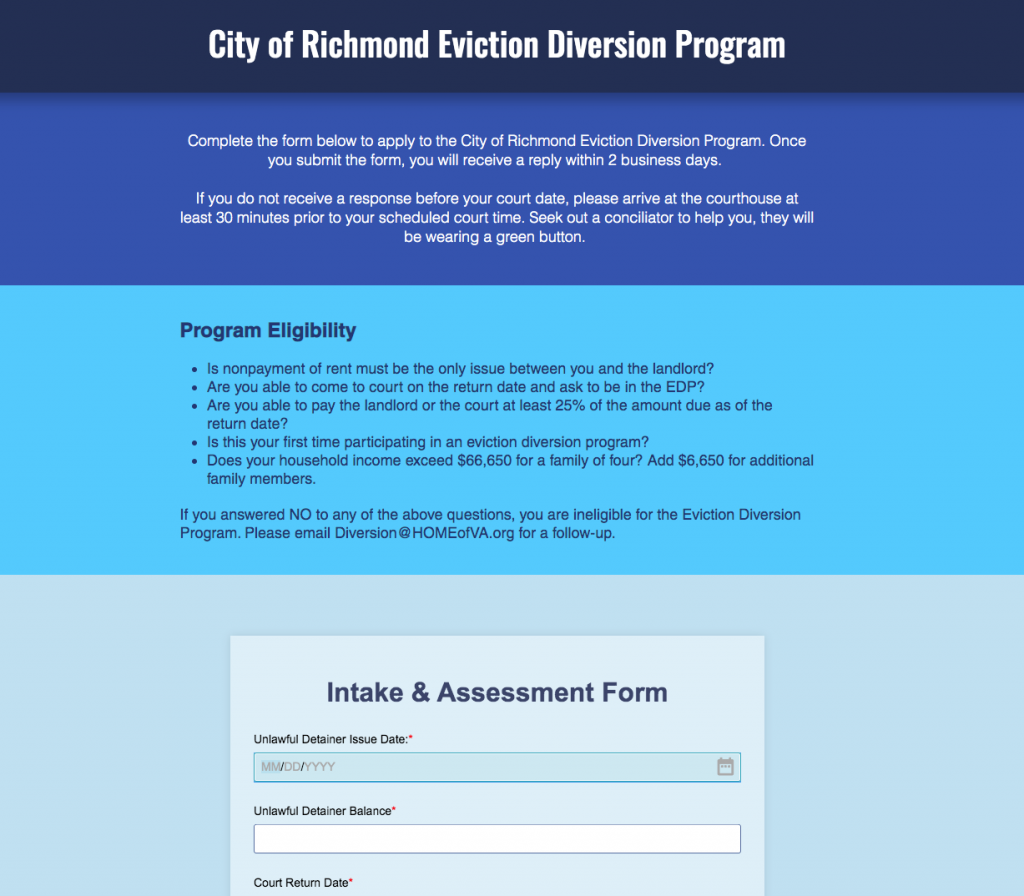
Eviction Diversion Program in Richmond, VA
The Eviction Diversion program provides tenants who have received an unlawful detainer (and satisfy other eligibility criteria) with the opportunity (if their landlord agrees) to enter a voluntary conciliation procedure and to receive financial literacy education and financial assistance, as opposed to going through the court eviction process.
